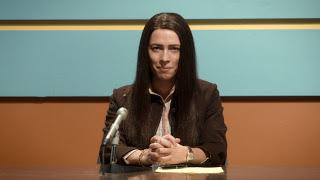
"We all have these different versions of ourselves competing to be the real us."
Few movies even try to capture depression accurately, making Antonio Campos's Christine (2016) especially resonant. Rebecca Hall brilliantly captures the struggles of a woman whose on-air immolation became notorious.Sarasota newscaster Christine Chubbuck (Rebecca Hall) runs a talk show, Suncoast Digest, in 1974. She struggles with the demands of her job; her desire to cover serious issues clashes with her boss's (Tracy Letts) desire for bloody, sensational news. Christine also deals with recurrent stomach pains, a demanding mother (J. Smith-Cameron) and worst of all, loneliness and depression. Unable to separate her personal despair from her professional problems, Christine decides to go out with a bang - on live television.
Ms. Chubbuck was a real person whose suicide became a grim punchline; she may not have directly inspired Network's Howard Beale, but it's easy to see the connection. Christine isn't overly interested in that, folding its concerns about shallow tabloid journalism into its portraiture (Watergate is an endless blur on background televisions as characters discuss human interest stories). Instead, Santos peels back our cultural filter to expose a desperate, wounded woman. As such, the movie proves a remarkably poignant, gripping character study, showing Chubbuck's descent into despair.
Santos and writer Craig Shilowich are both sympathetic and unsparing in depicting Christine. She goes through the motions of a humdrum life, erecting a psychological wall and bickering with superiors. Young, beautiful and successful as she is, she can't enjoy herself; her "moods" erupt at the worst moments, driving her mother, friends and coworkers to distraction. She deals with a boss who alternates between sexist barbs and general condescension; concerned with ratings, he dismisses Christine's hard news ideas for flashy stories about murders and bloodshed.
Thus Christine's despair overshadows her life. She hosts puppet shows for sick children, yet flounders at parties; surgery renders her sterile and further erodes her self-esteem. Her only connections are with her mother, whose personal life prevents her from empathizing, and anchor George (Michael C. Hall), who takes her on a date and therapy session after revealing his own problems. Unfortunately, George accepts an out-of-town job offer which rips away Christine's hope. Listening obsessively to her police scanner, her boss's insults ringing in her ears, she reaches the stage where suicide seems the only option.
Rebecca Hall gives an excellent performance, avoiding obvious flourishes for rich relatability. Able to affect cheeriness for the camera (she even worries about being too sympathetic!), she nonetheless offers a beaten-down, disoriented quality from frame one. Hall underplays the role marvelously, allowing doubt and anxiety to seep into every day situations, coming through in a wayward glance, a hesitant stammer, an inopportune outburst or frozen stare. It's a performance of marked, marvelous complexity that makes Christine achingly human.
As someone who's wrestled with depression, I found Christine wrenching and real. Sadly, not everyone's able to overcome their personal demons, though few explode quite so dramatically. In her own mind, Chubbuck solved both her problems and those of the station: violence "in living color" which made her notorious. Thankfully, Christine finds her death less interesting than who she was in life.

